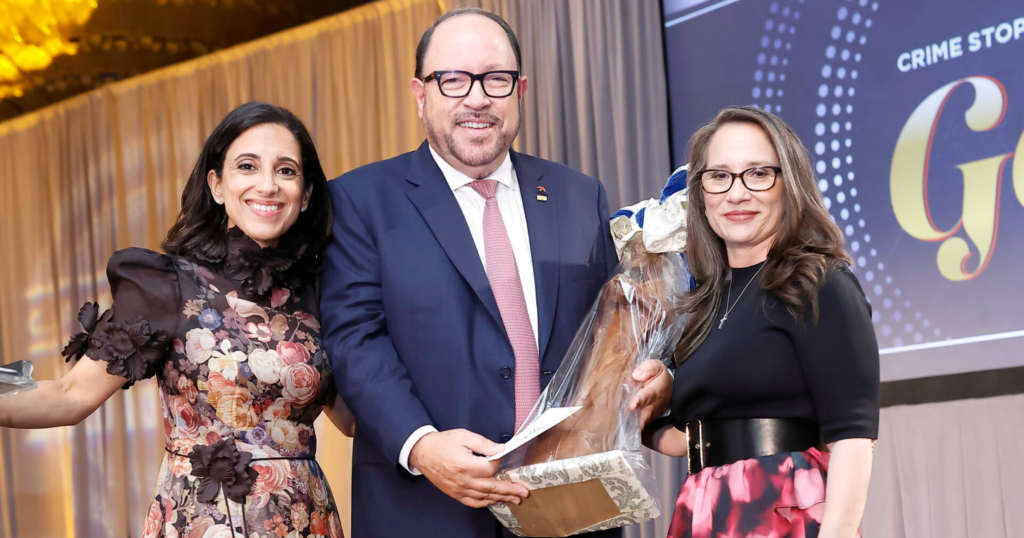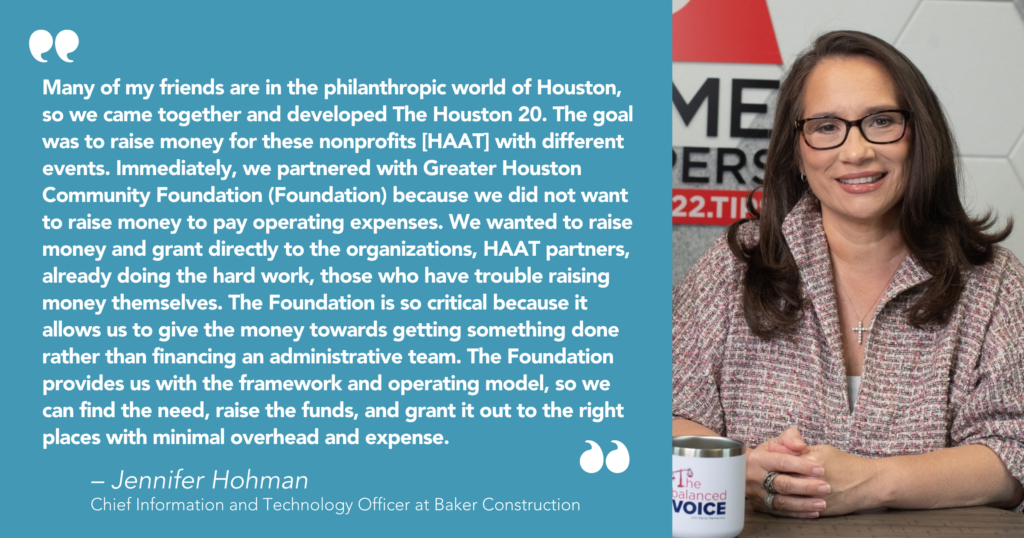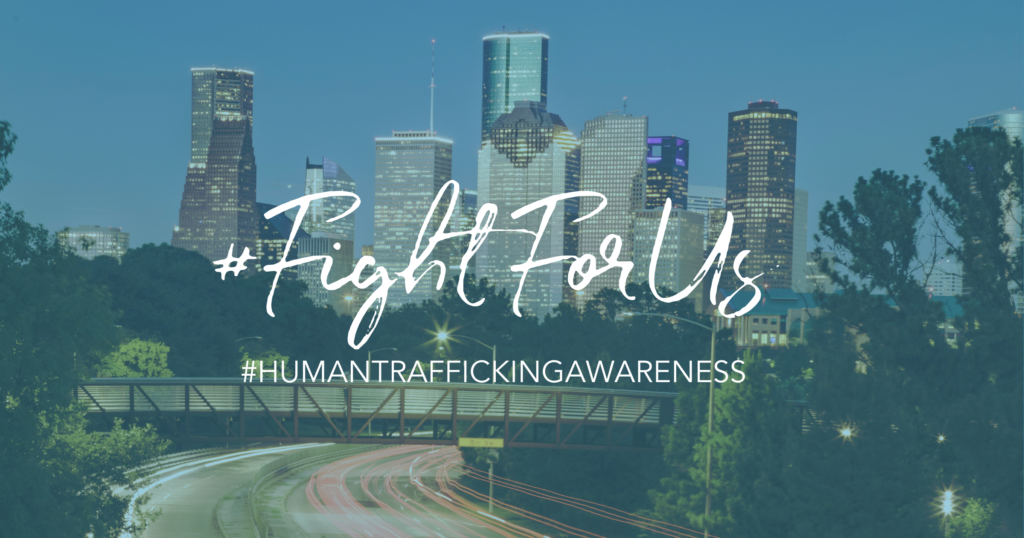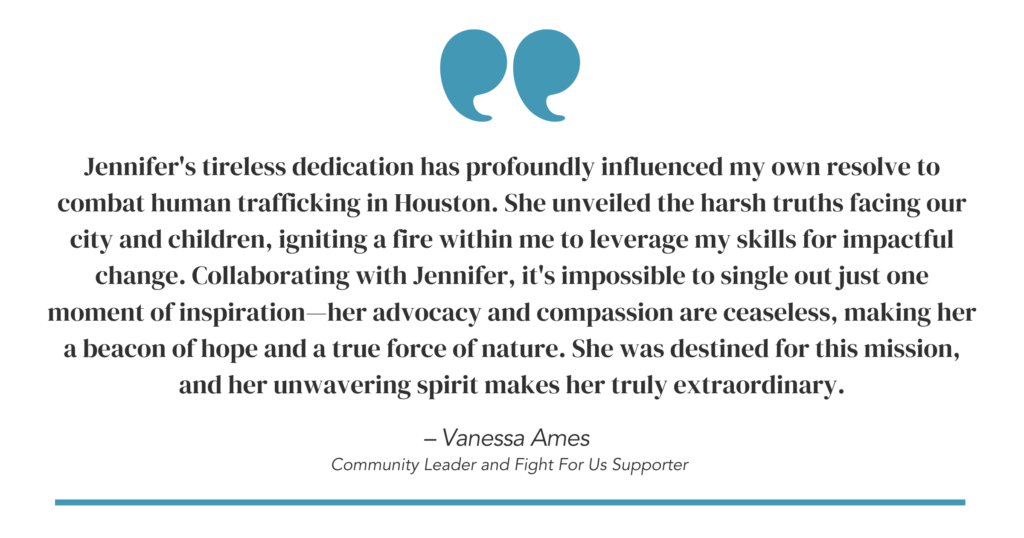Combating Human Trafficking in Houston: Jennifer Hohman’s Fight for Justice

Human trafficking is a pervasive and complex issue that plagues cities around the world, including Houston. Jennifer Hohman, Chief Information and Technology Officer at Baker Construction by day, has made it her mission to combat this crime through her dedicated efforts and entities, yes, entities plural, in her personal life. Read more to gain a better grasp of the robust human trafficking problem in Houston, its impact, and key concepts. Understand how Hohman makes a difference and discover ways you can get involved in the fight against human trafficking in your community.

Understanding Human Trafficking: Key Concepts
To better understand human trafficking as a whole, it’s essential to clarify some commonly used terminology. Based on our conversation with Hohman, below are some key terms to provide a comprehensive overview of this complex issue.
Human Trafficking:U.S. law defines human trafficking as the use of force, fraud, or coercion to compel a person into commercial sex act, labor, or services against his or her will. It involves the recruitment, transportation, transfer, harboring, or receipt of persons, especially women and children, using threat, force, coercion, abduction, fraud, deception, or abuse of power for exploitation.
Coercion: The abuse or threat of abuse to get someone to act against their own will.
Exploitation: At the heart of human trafficking is exploitation, where traffickers control and utilize another person’s body for their gain. This often involves coercion, manipulation, and abuse.
Grooming: The act of a trafficker manipulating or luring a child or vulnerable person into a relationship, often online.
Overcomer: A human trafficking survivor. Some former victims prefer to be called overcomers rather than survivors, as the focus is shifted to leveraging their lived experience to help others.
Sellers: This term refers to adult women selling their own bodies. Those without pimps are often labeled as prostitutes, while those with pimps are victims, a minor is always considered a victim, highlighting the complexity of consent and coercion.
Survivor-Led Initiatives: These initiatives are driven by individuals who have personally experienced trafficking.
Traffickers: Sometimes called a pimp, a trafficker exploits others for profit.
Victimless Crime: The notion that human trafficking is a victimless crime is misleading. In many cases, victims are prosecuted instead of the perpetrators (buyers and traffickers), underscoring the need for systemic change.
Hohman’s Journey: From Advocacy to Action
Hohman’s passion for helping women originated from her upbringing and an inherent belief in giving a hand up, not a handout. Her anti-human trafficking advocacy journey began in 2014 with the disappearance of schoolgirls in Chibok, Nigeria, sparking her first activism efforts. The issue hit closer to home in 2016 when four different families she knew had daughters groomed and lured online for sex. Seeing this trend happening in Houston, she became more engaged and felt compelled to learn more about its underlying causes and implications.
Recognizing the prevalence of trafficking in Houston and beyond, Hohman intensified her efforts in December 2016. She started raising awareness in her local community, starting with her son’s schools and even recruiting the father of an overcomer to share his family’s story. Hohman voiced, “I had been involved in the philanthropic scene in Houston all my life and had never heard about sex trafficking. To hear that Houston is a hub, just as every major city is, I started to get really frustrated that people, including myself, didn’t know more about it. Houston claims to be a philanthropic city, but then we have people being exploited, and no one is talking about it.”
Hohman channeled her frustration into a driving force for action. She dedicated herself to deepening her understanding of human trafficking in Houston and sharing her knowledge with others. She started building an alliance amongst anti-trafficking nonprofit organizations and hosting monthly meetings to learn and strategize at her house. What became prevalent is that not a lot of continuous funding goes to these organizations. Hohman shared, “It’s one of those causes that people may give to once or twice, but to get involved any deeper is emotionally traumatizing. Many people do not engage in the long-term support of these nonprofits.”
The connections made with organizations fighting for the sexually exploited in Houston eventually led to the establishment of Houston Area Against Trafficking (HAAT), a collaboration of nonprofits working together to understand and address trafficking issues. By pooling their resources and expertise, these organizations developed a comprehensive citywide strategy to combat sex trafficking in the Houston metro area by filling gaps and strengthening services. Soon after the establishment of HAAT, The Houston 20 was formed with a focus on fundraising to support anti-trafficking initiatives and grants to nonprofit organizations that provide direct services to victims and survivors, end demand, raise awareness, and strengthen advocacy efforts.

As she worked to raise awareness about this issue, families started to contact her to help find their children. Moved by their stories, Hohman took it a step further by partnering with qualified, specialized nonprofits, private investigators, and law enforcement to assist these hurting families. These groups worked collaboratively, providing direct support to those affected, searching for the missing children and women, and once found, assisting them in rebuilding their lives through access to restorative and residential services.
Hohman’s relentless fight for those impacted by human trafficking ultimately led to establishing Fight For Us. Hohman shared, “I started working on a lot of individual cases, which led to Fight For Us. Fight For Us helps women and children get out of the trafficking life and gain independence. We want these women and minors to get access to anything they need through our robust network of nonprofit partners and others willing to help, whether it is emotional, mental, or financial support during and after escaping their trafficked situation. Oftentimes, this work involves getting overcomers out of Texas as pimps can have expansive reach.” Today, Hohman has helped with hundreds of cases, even connecting families with missing children to a pro-bono private investigator to help find their children.

Common Misconceptions About Human Trafficking
We asked Hohman to “debunk” some of the common misconceptions about human trafficking, and she shared the following:
Misconception 1: Human trafficking primarily involves foreign-born individuals or is concentrated around the border.
Reality 1: The majority of trafficking victims in the U.S. are American, typically young women and children. The average age of those affected is decreasing rapidly.
Misconception 2: Women choose to sell their bodies.
Reality 2: Many women and children are groomed, lured, and coerced into trafficking situations, often beginning with romantic manipulation or financial duress.
Misconception 3: Traffickers and buyers are easily identifiable or look “sleazy.”
Reality 3: Traffickers and buyers can be anyone, including professionals and seemingly upstanding community members.
Misconception 4: Traffickers are the only problem.
Reality 4: If there were NO buyers, there would be no traffickers!
Misconception 5: Large-scale sporting events, like the Super Bowl or World Cup, increase human trafficking.
Reality 5: Anytime there is a condensed concentration of men in an area, demand increases. While sporting events increase demand, so do professional conferences.
Misconception 6: People believe their families are safe, and this could never happen to their child.
Reality 6: Trafficking occurs in all areas, suburban and rural, and has no socioeconomic, cultural, or gender barriers. Once a child has access to unmonitored social media, they are an immediate target to be exposed to grooming.
Jennifer Hohman’s Impact and Recognition
Hohman is a passionate anti-trafficking advocate and founder of four organizations (Fight For Us, HAAT, The Houston20 and the former Oil and Gas Trafficking Awareness Group/OGTAG), each playing a pivotal role in combating human trafficking in Houston. Her tireless efforts have not gone unnoticed. In March of 2024, Hohman received the FBI Director’s Community Leadership Award. This recognition is a testament to her dedication and commitment to making a difference.
Hohman has partnered with the FBI on several cases, playing a pivotal role in ensuring that victims of human trafficking receive the restorative care they so desperately need. Her collaborative efforts have led to the successful resolution of numerous cases, providing a beacon of hope for those affected by this devastating crime.
The FBI Director’s Community Leadership Award is a humbling acknowledgment of Hohman’s work, validating her unwavering dedication to this crucial mission. Despite the emotional and mental toll this work can often take, Hohman remains committed to her mission, driven by her family’s support and the impactful efforts on countless lives.
We also spoke with local Community Leader Vanessa Ames about Hohman’s commitment to anti-trafficking efforts in Houston, and she shared, “Jennifer’s dedication to anti-trafficking efforts is matched only by her unwavering commitment as a professional and loving mother of two. Her lifelong passion for ending sex trafficking fueled the creation of the ‘Fight for Us’ movement, a powerful advocacy initiative striving to eradicate sex trafficking and the sex trade in Houston and Texas. Jennifer stands as the foremost supporter of nonprofits across Texas that deliver vital services to victims and survivors, work tirelessly to end demand, and push for legislative change. She and her family open their hearts and homes to those in need, providing sanctuary and support to victims and their families.”

Supporting the Fight Against Human Trafficking
Human trafficking is a prominent issue in Houston with no socioeconomic barriers, yet many philanthropic Houstonians are aware of it but not engaged with it. Hohman stresses the need for community support through donations, raising awareness, and advocating for systemic changes. Supporting local anti-trafficking organizations can make a substantial impact.
Combating human trafficking requires ongoing, persistent efforts to combat it. Educate yourself to protect your loved ones, support local organizations, and stay vigilant. Together, we can make a difference and end this pervasive crime.
More Helpful Articles by Greater Houston Community Foundation:
- How to Give Back to Your Community
- What to Do with an Inheritance
- Aunt E’s Radical Generosity
- The Community Connector: Arcy Muñoz
This website is a public resource of general information that is intended, but not promised or guaranteed, to be correct, complete and up to date. The materials on this website, including all comments and responses to comments, do not constitute legal, tax, or other professional advice, and is not intended to create, and receipt or viewing does not constitute, nor should it be considered an invitation for, an attorney-client relationship. The reader should not rely on information provided herein and should always seek the advice of competent legal counsel and/or a tax professional in the reader’s state or jurisdiction. The owner of this website does not intend links on the website to be referrals or endorsements of the linked entities.